Search the Special Collections and Archives Portal
Search Results

Transcript of interview with Myoung-ja Lee Kwon by Claytee White, September 4, 2004
Date
Archival Collection
Description
Myoung-ja Lee Kwon began her life on the grounds of the Kyongbok Palace in Korea. In a country where education is valued, her father's occupation as a university professor meant that the family was highly honored, thus this palatial space allowed them live in a state of prosperity. But war changed these circumstances and in this interview Kwon vividly explains the family's evolution. In 1965, after graduation from Seoul National University she married and a year later, moved to the United State of America where she earned a Master's degree in Library Science in Provo, Utah. Her first professional position was at the University of Nevada Las Vegas as a cataloguer and after many promotions, became interim dean of UNLV Libraries. In 2001, she took the job as Dean of Libraries at California State East Bay Library, retiring in 2008. Currently, she serves as a special lecturer and discussion leader with the Fulbright Senior Specialist Program. During her 2009 visit to Korea, she pr
Text

Transcript of interview with Charlene Herst by Barbara Tabach, September 09, 2016
Date
Archival Collection
Description
In 2014, Charlene, n?e Friedkin, Herst retired from her state government career, settled into volunteer work, being a mother and grandmother, and being a grant writer for others. After thirteen years in Carson City, she came back home to Las Vegas. Charlene was eight years old when her parents, Patricia and Richard Friedkin, moved their family to Las Vegas from northern California. She remembers vividly the hot day that they arrived and moved into a rental house in the desert across from Woodlawn Cemetery. Her father, formerly in the grocery business, found work at Vegas Village. Two years later they moved ?into Las Vegas at the very edge?which was Oakey.? She recalls people she has known since those first years who have been instrumental in the growth of Las Vegas; the challenges of being a divorced single mother of four; and the career path that began with an invitation from Gene Greenberg to apply for a part time position at Channel 3, where he was sales manager. At Channel 3 she quickly went from part time to full-time. She started the Community Projects Board, which brought together nonprofit organizations together at the studio in the 1980s to identify and develop marketing campaigns that addressed social issues in the community. Initiatives included Baby Your Baby and Smoking Stinks. While working for Channel 3, she also attended UNLV and received a communications degree in 1995. In 1997 she worked at Sierra Health Services in public relations. Then in October 2001, Charlene started her career in state government as the Nevada State Health Division?s Manager of the Tobacco Program. Over the course of her thirteen year career with the state, she was promoted to positions that continued her dedication to improving the quality of life of all Nevadans. She was instrumental in the implementation of the Nevada Clean Indoor Air Act (2006); improving prevention services to women; reducing the rate of substance use and abuse in the state. The date of her retirement, October 10, 2014, was officially proclaimed in honor of Charlene Herst by Governor Brian Sandoval.
Text

Transcript of interview with Earl A. Evans by Lance Malone, March 15, 1981
Date
Archival Collection
Description
On March 15, 1981 Lance Malone interviewed Sears Roebuck Division Manager, Earl A. Evans, Jr., (born March 3rd, 1935 in Alhambra, California) in Las Vegas, Nevada. This interview covers the history of Nevada and Mr. Evans’s life. During the interview, Mr. Evans discusses education, sports, employment, the weather and the railroad in Las Vegas. He also discusses transportation, recreation, community involvement, raising a family in Las Vegas, the development of Fremont and the Strip, and religious activities. Mr. Evans served as a Bishop for the LDS Church in Las Vegas and in regards to education, he served on the Clark County School Board.
Text
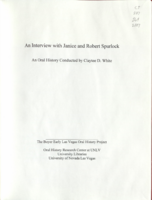
Transcript of interview with Janice and Robert Spurlock by Claytee White, June 17, 2010
Date
Archival Collection
Description
Janice and Robert Spurlock were married in 1990 and each has a lifetime of Las Vegas memories. They have made Sandy Valley home for nearly 32 years. Together the couple recalls the people and places of Las Vegas' past from their points of view during this oral history interview. For Janice the stories begin in the 1930s after her family moved to Las Vegas from California. She was a youngster of about five. Among the topics she talks about is walking to Fifth Street Grammar School, graduating from Vegas High School, and fun had during Helldorado Days. In 1953, Robert arrived. He was a young man headed from Arizona to Colorado seeking work as a welder. He stopped in Henderson, Nevada and never quite made it out of the area. For the next two decades he worked construction and helped build many local landmarks. He shares stories about the range wars and about being accidentally exposed to radiation from the Nevada Test site.
Text

Transcript of interview with Frank Cope by Marianne Johnson, March 15, 1978
Date
Archival Collection
Description
Text
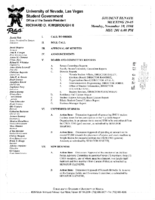
Meeting minutes for Consolidated Student Senate University of Nevada, Las Vegas, November 30, 1998
Date
Archival Collection
Description
Text
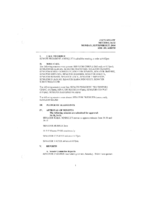
Meeting minutes for Consolidated Student Senate, University of Nevada, Las Vegas, September 27, 2004
Date
Archival Collection
Description
Text
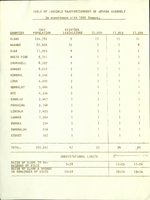
Legislative counsel bureau reports, sample apportionments, county populations and final apportionment for legislative reapportionment, 1965
Date
Archival Collection
Description
Group of documents dealing with the legislative reapportionment of the Nevada State Assembly based on population distribution.
Text
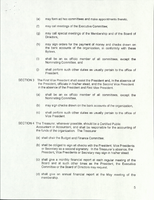
Temple Beth Sholom Master by-laws, February 12, 1998
Date
Archival Collection
Description
This document establishes the purposes and duties of the board of directors and the make up of the membership of Temple Beth Sholom.
Text
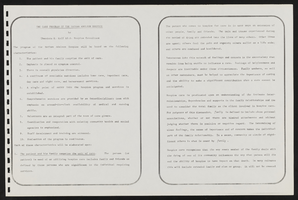
Program for the Design and Operation of The Nathan Adelson Hospice, circa 1980
Date
Archival Collection
Description
A program for the design and operation of The Nathan Adelson Hospice in Las Vegas, Nevada. Included in the program are several appendices on functions, regulations, services, and standards, along with several pages on establishing goals for the hospice. Pages near the end include hand-drawn diagrams and several monetary finance charts.
Text
